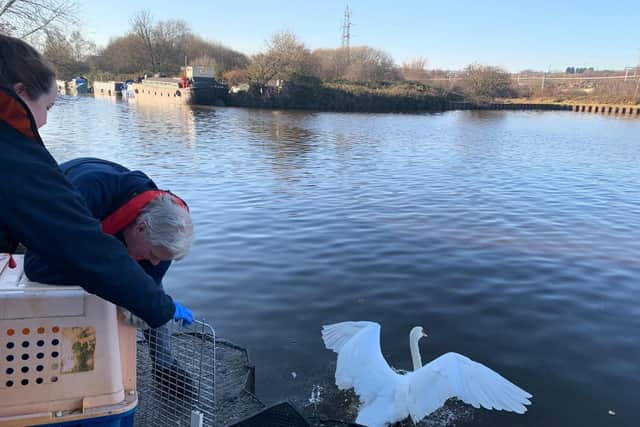Watch moment swans rescued from oil spill caused by flooding in South Yorkshire are released back into the wild
The RSPCA launched a rescue mission when the birds were affected by the oil in the Parkgate Canal Basin, near where it connects with the River Don, off Rawmarsh Road in Rotherham.The oil is thought to have come from cars which had become trapped in nearby floodwater.
It took officers from the charity four days to catch the 49 birds so they could be taken to its Stapeley Grange Wildlife Centre in Nantwich, Cheshire and East Winch Wildlife Centre in Norfolk, for treatment.
Advertisement
Hide AdAdvertisement
Hide AdStaff at the two centres have since cleaned the swans and nursed them back to full health. A total of 26 birds were released back into their home on December 4, with the rest to be taken back over the coming days.


28 shocking photos of the flooding in YorkshireMan's body found under flood water in YorkshireRSPCA Inspector Sara Jordan, who headed up the four-day rescue, said: “It is always a great part of the job to release a recovered animal back into their habitat. They seem so much healthier now compared to when we rescued them and much happier.
“It was so important we rescued the swans as pollution on the bird’s feathers damages the structure of them and also when they are preening they ingest the contaminants and this makes them ill. When they are preening they are not eating so lose weight and become weak.
“If oil is not removed from waterbirds it reduces the natural waterproofing in their plumage, leaving them at risk of dying from hypothermia - so it is vital that they are treated as soon as possible.
Advertisement
Hide AdAdvertisement
Hide Ad“It was a really successful operation. Managing to capture so many swans is quite a big task but we had such a fantastic team of specially trained water rescue officers to assist with a number of boats being used.
“The amazing staff at Stapeley Grange and East Winch then quickly got to work on the rehabilitation side and we now have the swans back to full health in their natural habitat which is great.”